100 years later in New York: #BeArmenian, #BeAlive (original) (raw)
The ceremony of the official launch of 100 LIVES initiative founded by Ruben Vardanyan, Noubar Afeyan and Vartan Gregorian was held on March 10 evening at Harold Pratt House in New York.
In his speech, Ruben Vardanyan recalled that “100 years ago a group of well-off Americans gathered not too far away from here, at Plaza Hotel, in order to allocate funds for hundreds of thousands of forgotten Armenians who were faced with death.”
It should not be ruled out that Harold Pratt, American oilman and philanthropist who headed the Council on Foreign Relations in 1923-1939 and bequeathed his house to this organization, could also be among those Americans.
On March 10, one of the most influential American “think-tanks” let the 100 Lives initiative have his private residence and a certain “link of times” can be observed in here. After the Armenian Genocide in 1915, Americans – both wealthy and ordinary citizens – raised over USD 100 million or USD 2.5 billion in today’s monetary terms.
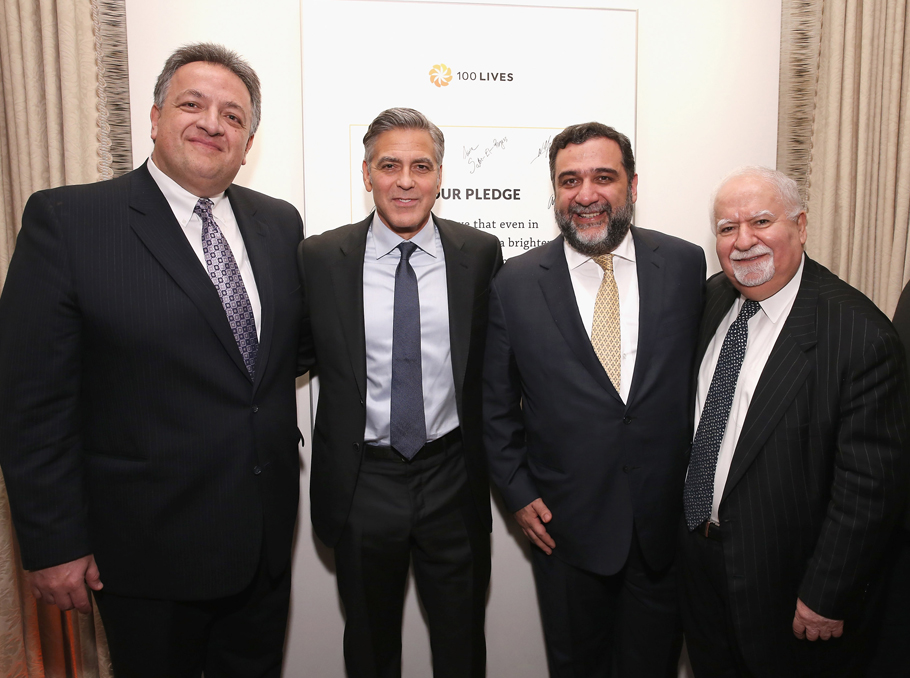 Noubar Afeyan, George Clooney, Ruben Vardanyan and Vartan Gregorian
Noubar Afeyan, George Clooney, Ruben Vardanyan and Vartan Gregorian
Photo: Edelman
Vartan Gregorian said that holding the event in New York is symbolic for a bunch of reasons. “This is the city of Henry Morgenthau, who was among the first to raise his voice in defense of Armenians. The New York Times, which gave a detailed chronicle of what the Armenians had to go through, is being published in this city. The UN Headquarters – an organization the mission which mission is to prevent human rights violations and crimes against humanity – is located in this city. And it’s exactly in New York that the Catholics, Protestants and Jews, democrats and republicans raised funds for the Near East Relief Foundation and raised over USD 100 million to help Armenians, while initially they were planning to raise merely 100 thousand,” noted Vartan Gregorian.
Idea and founders of 100 LIVES initiative
In his interview to Mediamax published on March 10, one of the three founders of 100 LIVES initiative Ruben Vardanyan gave quite a detailed account of the initiative’s idea.
According to him, the project is based on the link between the past, present and future. The first element is remembrance of the past. 100 LIVES initiative will help digitize millions of pages of archive materials not only in Armenia but also in the Diaspora. Besides, the initiative collects personal stories of Armenian Genocide survivors and those who stretched out a helping hand to them.
The second element of 100 LIVES initiative is Aurora Annual Global Humanitarian Award.
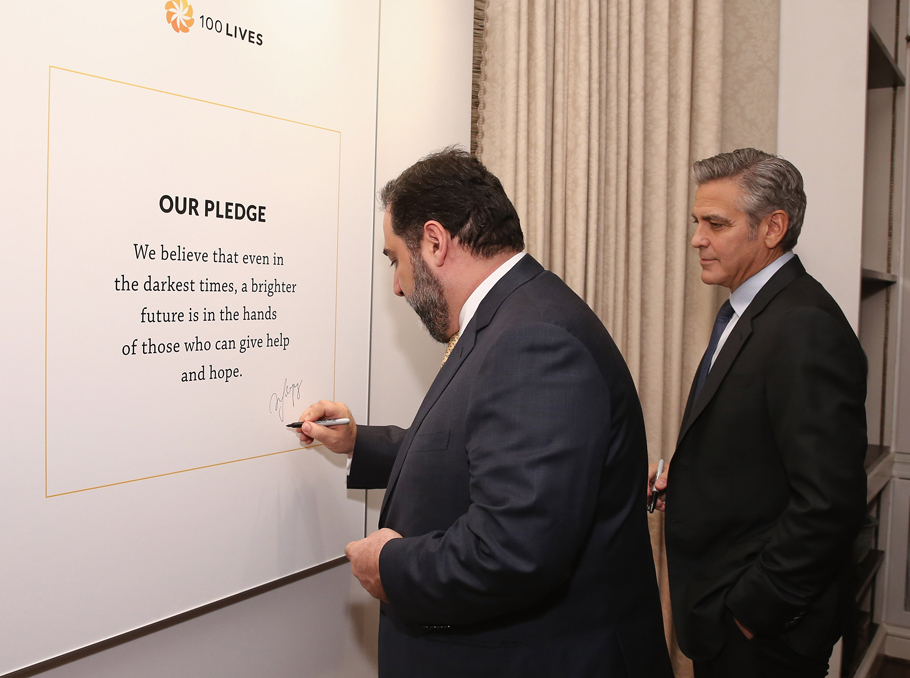 Ruben Vardanyan and George Clooney
Ruben Vardanyan and George Clooney
Photo: Edelman
The third element embodying the future is gratitude through special projects. In particular, 100 scholarships will be offered for children from Arab countries to study at UWC Dilijan College. Ruben Vardanyan’s interview presents this vision in details.
“Resilience, fortitude and gratitude are characteristics peculiar to Armenians. However, these traits are common to all the people, not only us. We developed the concept of #BeArmenian #BeAlive to encapsulate the strength of the human spirit – not just for Armenians, but for everyone,” commented another Co-Founder of 100 LIVES initiative, popular American venture capitalist, scholar and philanthropist Noubar Afeyan.
Former President of the New York Public Library, 12th President of Carnegie Corporation of New York Vartan Gregorian is one of the most respected Armenians in the U.S. and around the world. He is the third Co-Founder of the 100 LIVES initiative.
“There are a small number of survivors of the Armenian Genocide left with us. It is crucial that we ensure that, as we approach the centennial, we take this opportunity to leave a lasting imprint of what happened a century ago onto the world’s collective conscience,” remarked Vartan Gregorian.
Family stories and the global award
“My sister Marina and I would not be born had our grandfather, who lost his parents in Western Armenia, not appeared in the orphanage founded by American missionaries,” said Ruben Vardanyan at the ceremony. He recalled that the number of the Armenian population reduced to half a million after the Genocide and today, 100 years later, there are around 10 million Armenians in various corners of the world.
Noubar Afeyan said that his grandfather Petros was rescued by German officers working on the construction of the Berlin-Baghdad Railway. “Amazingly, even though the German authorities were backing the government of the Young Turks, there were people among the German military who saved Armenians,” he noted.
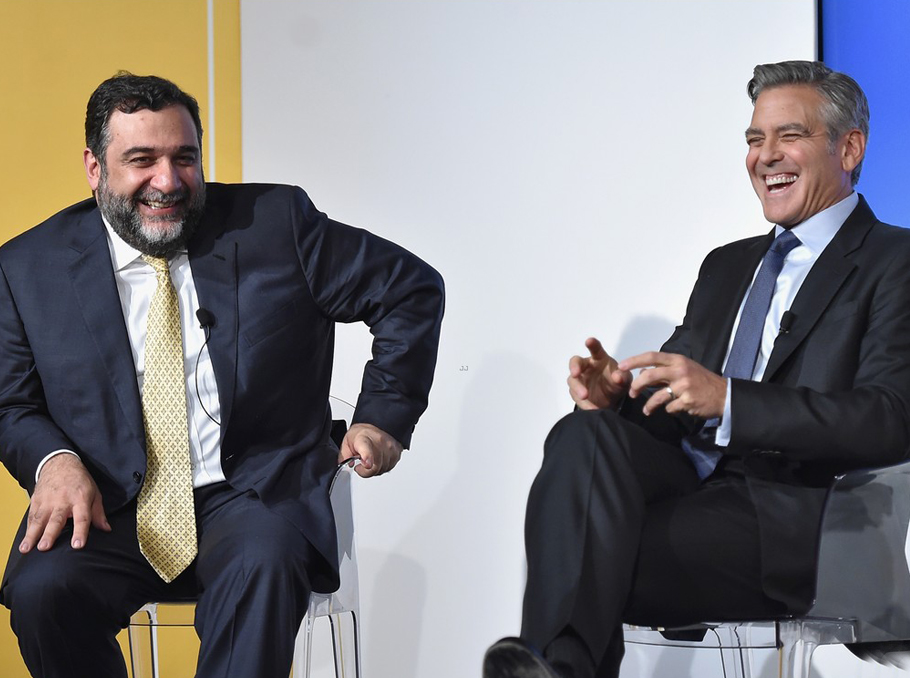 Ruben Vardanyan and George Clooney
Ruben Vardanyan and George Clooney
Photo: Getty / Mike Coppola
Along with hundreds and thousands of stories of the rescue of Armenians this story inspired the initiators of the project to launch Aurora Annual Humanitarian Prize for Awakening Humanity within the 100 LIVES initiative. The annual grant of USD 1 million will be awarded in Yerevan to people and organizations who presently struggle against blatant atrocities and injustice.
The Jury is impressive. It is co-chaired by Hollywood actor and Oscar-winning actor George Clooney and Nobel Laureate Elie Wiesel. Nobel Peace Prize Winner, former President of Costa Rica Oscar Arias, former Australian Foreign Minister Gareth Evans, former President of Ireland, former UN High Commissioner for Human Rights Mary Robinson, UN Special Representative of the Secretary General on Human Rights Defenders Hina Jilani and President of Carnegie Corporation Vartan Gregorian will also serve on the Prize’s Selection Committee.
The inaugural Prize will be awarded at a ceremony with the participation of Elie Wiesel and George Clooney to be held in Yerevan, Armenia on April 24, 2016.
Arshaluys-Aurora
The prize is named after Arshaluys Mardikyan, who after the Armenian Genocide and wanderings around the world appeared in the U.S. and took the name Aurora Mardiganian. She wrote a book called “Ravished Armenia”, which presents those dreadful events. This book was taken as a basis for the movie in which Aurora starred. For many years this movie was a crowd-puller in the U.S., and it played an enormous role in raising awareness about the Armenian Genocide.
Arshaluys was 14 when in summer of 1915 the wave of massacres and deportation also reached the province of Kharberd where her birthplace – Chmshkatsag village – was located. Surviving the massacres and going through all the horrors of the Armenian Genocide Arshaluys moved to Tiflis, then to Saint-Petersburg. She then moved to Norway and following it, to New York, U.S. It’s where she started to put down the story of her life.
The film contains episodes showing naked Armenian girls nailed to crosses. However, almost 70 years later Mardiganian revealed to film historian Anthony Slide that reality was way more dreadful:
“The Turks took the clothes off the girls. They made them bend down, and after raping them, they made them sit on the pointed wood, through the vagina. That's the way they killed - the Turks. Americans have made it a more civilized way. They can't show such terrible things.”
According to unconfirmed information, exactly Arshaluys-Aurora’s story prompted the Netherlands State Institute for War Documentation to publish “The Diary of a Young Girl” (also known as “The Diary of Anne Frank”), which the Jewish girl kept from 1942 to 1944, during the Nazi occupation of the Netherlands.
Presently millions of people know the name Anne Frank and her diary was included in UNESCO Memory of the World Register in 2008, while Aurora died alone in Los Angeles in 1994. They say her body lay in the morgue for several months and after that she was buried in a common grave... The prize named after Aurora Mardiganian, which will be awarded in Yerevan annually, is an exceptional opportunity to honor the memory of the girl who went through unspeakable horrors.
Elie Wiesel and Forty Days of Musa Dagh
86-year-old Elie Wiesel ranked the 11th in Jerusalem Post’s annual rating of the 50 Most Influential Jews of 2014.
Born in Romania and having lost his parents and sister in Auschwitz concentration camp, Elie Wiesel went to Paris after liberation, from where he later moved to the U.S. where he became a popular writer and public figure.
Elie Wiesel lectured at the universities of Yale, Boston and Georgetown, chaired the U.S. President's Commission on the Holocaust, and in 1980-1986, Elie Wiesel was the Chairman of the U.S. Holocaust Memorial Council.
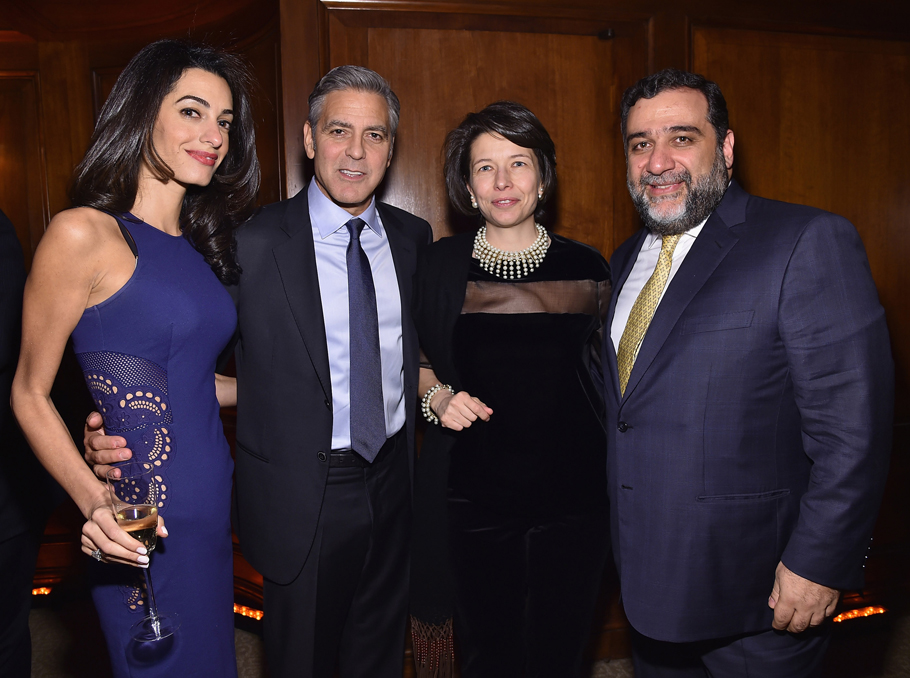 Amal and George Clooney, Veronika Zonabend and Ruben Vardanyan
Amal and George Clooney, Veronika Zonabend and Ruben Vardanyan
Photo: Edelman
In May 2014, the solemn opening of the first Holocaust Education Center in Romania opened in Sighet, the birthplace of the Nobel Laureate.
“I have personally witnessed the devastation that genocide wreaks, which sadly continues today,” said Elie Wiesel. “But I also recognize the resilience of the human spirit,” he continued. “We must remember and honor the remarkable efforts of those saviors who intervened a century ago to prevent such atrocities from ever happening again.”
In his introduction to the 1986 French edition of Franz Werfel's Forty Days of Musa Dagh Elie Wiesel described the brutalities committed by the Ottoman Empire against the Armenian minority as “the first genocide of the 20th century.” In 2000, he joined 125 Holocaust scholars in signing a joint declaration affirming that the Armenian Genocide was an incontestable historical fact and called on Western governments to likewise recognize it as such.
In his video message to the participants of March 10 ceremony, Elie Wiesel said that “Armenians were the first victims of mass killings later qualified as genocide”. Speaking about the 100 LIVES initiative he underlined that “the history refers to not only the past, but also to the present and the future.”
George Clooney and “Incirlik” U.S. air base
George Clooney stated at the ceremony that he is honored to be associated with 100 LIVES as it shares a common mission with his foundation, Not On Our Watch, to focus global attention on the impact of genocide as well as putting resources towards ending mass atrocities around the world. “It should weigh heavily on all of us that genocide still takes place today,” said George Clooney.
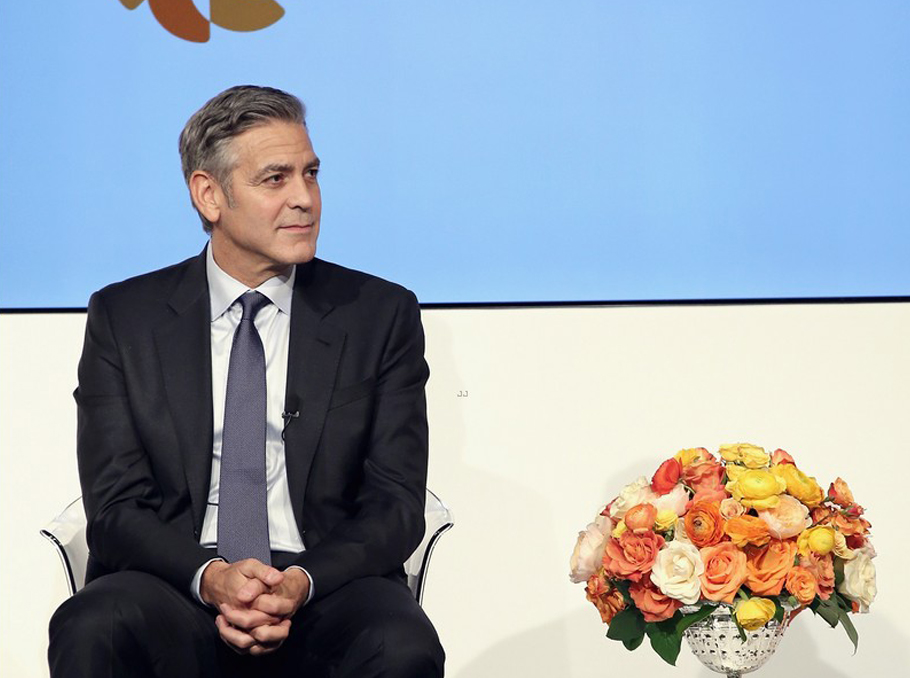 George Clooney
George Clooney
Photo: Getty / Mike Coppola
Not On Our Watch was founded by George Clooney, Matt Damon, Brad Pitt, and other celebrities. In 2008, the Foundation donated USD 500 000 to the World Food Program (WFP) of the UN to feed hundreds of people in Darfur, Sudan. Prior to that, Not On Our Watch raised over AMD 9 million for Darfur. George Clooney became an anti-genocide activist in Sudan after shooting the documentary on the crisis in Sudan in 2007.
Telling about how he started taking interest in the history of Armenia a few years ago, George Clooney subtly hinted that some American senators advised him not to forget U.S. interests in Turkey. “This is how I learned that we have Incirlik Air Base in Turkey”, said Clooney smiling.
Speaking about the Armenian Genocide in 1915, the actor stressed: “The fact the term “genocide” was introduced several decades after those horrible events doesn’t mean they didn’t take place!”
George Clooney also told those present that his wife Amal Alamuddin-Clooney who defended Armenia’s interests as a third country in Dogu Perincek v Switzerland case, didn’t know about his husband’s joint plans with Ruben Vardanyan until recently. “After the court hearing, many Armenians in Los Angeles confessed to me that they would like to kiss my wife,” smiled the Oscar-winning actor.
Ara Tadevosyan
New York